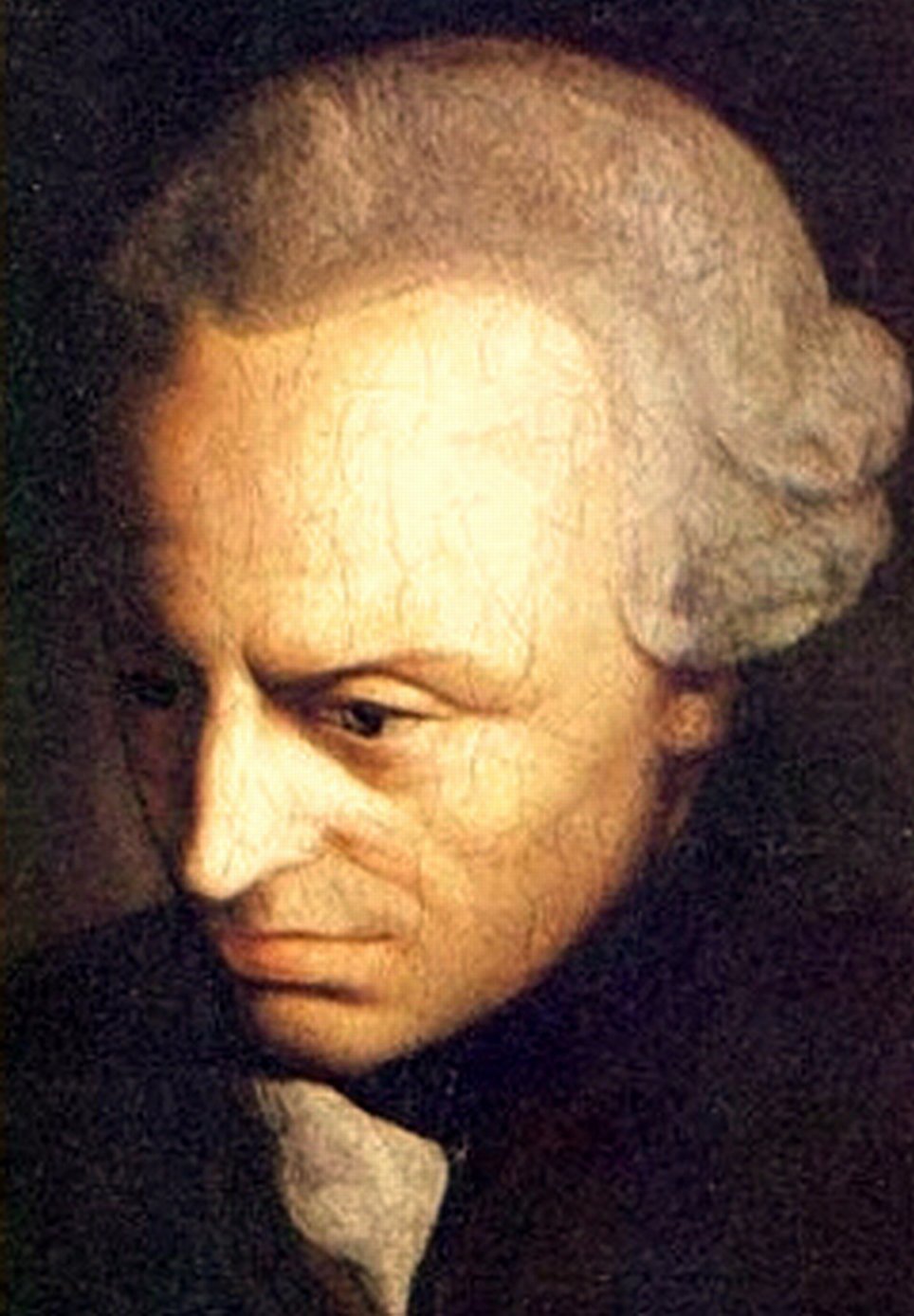
Image 1 Caption: Immanuel Kant (1724--1804), German philosopher, scientist, and theoretical astronomer, in a portrait showing a lot of craquelure.
Features:
- The Nebular Hypothesis
of Solar System Formation:
- In the context of
Newtonian physics, the
nebular hypothesis of
Solar System formation
was first fully theorized
by Kant---who is more famous
as a philosopher than as
an astronomer.
The theory
was in his book
Universal Natural History and Theory of the Heavens (1755).
Some parts were proposed by earlier in
1734 by
Emanuel Swedenborg (1688--1772)
(Wikipedia: Emanuel Swedenborg: Scientific studies and spiritual reflections in the 1730s):
Kant was familiar with this work
(see Wikipedia: Nebular hypothesis: History;
Wikipedia: History of Solar System formation and evolution hypotheses: Formation hypothesis).
- An important aspect of Kant's
nebular hypothesis
and of his cosmological
cosmological theory
(see below section The Nebulae)
was that they emphasized historical change in the
universe rather than
one changeless and eternal or one that was changeless and created at some instant in
time: the latter being
the common view among European
natural philosophers
in the 18th century
(see
Stephen Toulmin (1922--2009),
June Goodfield (1927--),
The Discovery of Time, 1965, p. 101, 125, 130--135).
Note, Kant's
theories were qualitative.
He was NO
mathematical astronomer.
- The Milky Way:
Kant was also the second to theorize that the Milky Way was a disk of the stars sustained against collapse to a single object by rotational motion (i.e., angular momentum) just as the Solar System is so sustained. The first for this Milky Way theory was Thomas Wright (1711--1786) (see Wikipedia: Thomas Wright: Astronomy) whose book Kant had seen a review of. The third was Johann Heinrich Lambert (1728--1777) who claimed to have come to his speculations NOT knowing of those of Wright and Kant. See No-404--407.

- The Nebulae:
- Image 2 Caption:
The first person in the
historical record to
theorize
that at least some of the
nebulae (historical usage)
were other galaxies (i.e., other
"Milky Ways") outside
of the Milky Way was
Sir Christopher Wren (1632--1723)
1657,
but this was forgotten until maybe
2019, and so unimportant
for the development of the
theory.
Wren's
theorizing is a credit to
his genius.
See also
Astronomer file:
christopher_wren.html.
- Important for said development was theorizing of
Emanuel Swedenborg (1688--1772)
(Wikipedia: Galaxy:
Distinction from other nebulae),
Thomas Wright (1711--1786)
(see Wikipedia: Thomas Wright: Astronomy;
Wikipedia: Galaxy:
Distinction from other nebulae),
and, most importantly, the philosopher
Immanuel Kant (1724--1804)
and the mathematician
Heinrich Lambert (1728--1777).
By the by, Thomas Wright (1711--1786) of Durham was surveyor, architect, antiquarian, and amateur theologian.
- Kant in his
was in his book
Universal Natural History and Theory of the Heavens (1755)
gave a dynamical sketch of
galaxy formation and evolution
(including the Milky Way as a
galaxy)
under the force of gravity
in the framework of
Newtonian physics, but
only qualitatively
(see Stephen Toulmin (1922--2009),
June Goodfield (1927--),
The Discovery of Time, 1965, p. 130--135).
Actually, Kant
went beyond Newtonian physics
and pictured a
cyclic universe
(finite or NOT)
where there was a cycle of
conflagrations and rebirths of the
universe.
It seems likely that Kant
for his cyclic universe
was reaching far back to the
stoic physics of
Greco-Roman Antiquity (c.800 BCE--c.500 CE).

- Image 3 Caption: The Big Crunch of modern cosmology (which occurs in currently unfavored theories) is the analogue to Kant's conflagrations which end cycles of his cyclic universe. See also Cosmology file: big_crunch.html.
- Johann Heinrich Lambert (1728--1777) also theorized about other galaxies and galaxy formation and evolution (including the Milky Way as a galaxy) under the force of gravity in the framework of Newtonian physics (No-407; Britannica: Johann Heinrich Lambert). Unlike, the earlier speculators, Lambert was a mathematician and augmented his speculations with actual calculations with Newtonian physics.
- Kant and Lambert's work did have significant influence on the thinking of astronomers of the next generation. William Herschel (1738--1822) in his cosmological researches was strongly influenced by Lambert's work (No-407).
- Image 3 Caption: The Big Crunch of modern cosmology (which occurs in currently unfavored theories) is the analogue to Kant's conflagrations which end cycles of his cyclic universe. See also Cosmology file: big_crunch.html.
- Kant as Philosopher:
Another of Kant's claims to fame is as the proposer of the categorical imperative as the foundation of morality/ethics:
-
Act so that the maxim
(determining motive of the will)
may be capable of becoming a universal law
for all rational beings.
And yet another is Kant's definition of the enlightenment applicable to The Enlightenment:
-
Enlightenment
is man's emergence from self-imposed immaturity.
Immaturity is the inability to use one's understanding without guidance from another.
This immaturity is self-imposed when its cause lies NOT
in lack of understanding, but in lack of
resolve and courage to use without guidance from another.
Sapere aude (dare to know)!
"Have the courage to use you own understanding!"---that is the
motto of
enlightenment.
-
---Emmanuel Kant,
Answering the Question: What is Enlightenment? (1784) quoted from
H. Floris Cohen's (1946--)
How Modern Science Came into the World: Four Civilizations, One 17th-Century Breakthrough (2011, p. 733).
- In the context of
Newtonian physics, the
nebular hypothesis of
Solar System formation
was first fully theorized
by Kant---who is more famous
as a philosopher than as
an astronomer.
The theory
was in his book
Universal Natural History and Theory of the Heavens (1755).
Some parts were proposed by earlier in
1734 by
Emanuel Swedenborg (1688--1772)
(Wikipedia: Emanuel Swedenborg: Scientific studies and spiritual reflections in the 1730s):
Kant was familiar with this work
(see Wikipedia: Nebular hypothesis: History;
Wikipedia: History of Solar System formation and evolution hypotheses: Formation hypothesis).
- Images:
- Credit/Permission: Anonymous artist,
18th century
(uploaded to Wikipedia
by User:Ben-nb,
2006) /
Public domain.
Image link: Wikipedia: File:Immanuel Kant (painted portrait).jpg.
- Credit/Permission: ©
David Jeffery,
2013 / Own work.
Image link: Itself.
- Credit/Permission:
User:Rogilbert,
2006 /
Public domain.
Image link: Wikipedia: File:Big_Crunch.gif.
-
Local file: local link: immanuel_kant.html.
File: Astronomer file: immanuel_kant.html.